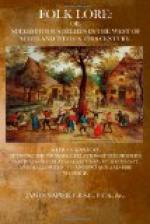Dr. Jamieson quotes the opinion of an English clergyman in reference to such proceedings of the Scotch Church:—“The ministers of Scotland, in contempt of the holy-day observed by England, cause their wives and servants to spin in open sight of the people upon Yule day, and their affectionate auditors constrain their servants to yoke their plough on Yule day, in contempt of Christ’s nativity. Which our Lord has not left unpunished, for their oxen ran wud, and brak their necks and lamed some ploughmen, which is notoriously known in some parts of Scotland.” By going back to the time of the Reformation, and finding what then were the practices of the people in the celebration of the Yule festival, and then by comparing these with the practices in vogue at the commencement of this century during the New Year festivities, we shall be led to conclude that the principal change effected by the Church was only respecting the time of the feasts, and we can thus perceive that the veto was not directed against the practices per se, but only against the conjunction of these practices, Pagan in their origin, with a feast commemorative of the birth of Christ. As they could not hold Christmas without retaining the Yule practices along with it, they resolved to abolish both.
Let us then pursue this retrospect and comparison. About the time of the Reformation the day preceding Yule was a day of general preparation. Houses were cleaned out and borrowed articles were returned to their owners. Work of all kind was stopped, and a general appearance of completion of work was established; yarn was reeled off, no lint was allowed to remain on the rock of the wheel, and all work implements were laid aside. In the evening cakes were baked, one for each person, and duly marked, and great care was taken that none should break in the firing, as such an accident was a bad omen for the person whose cake met with the mishap. These cakes were eaten at the Yule breakfast. A large piece of wood was placed upon the fire in such time that it would be kindled before twelve p.m., and extreme care was taken that the fire should not go out, for not only was it unlucky, but no one would oblige a neighbour, with a kindling on Yule.
On Yule eve those possessing cattle went to the byre and stable and repeated an Ave Marie, and a Paternoster, to protect their cattle from an evil eye.
On Yule morning, attention was paid to the first person who entered the house, as it was important to know whether such a person were lucky or otherwise. It was an unfriendly act to enter a house on Yule day without bringing a present of some kind. Nothing was permitted to be taken out of the house on that day; this prohibition of course, did not extend to such things as were taken for presents. Servants or members of the family who had gone out in the morning, when they returned to the house brought in with them something, although it might only be some trivial




